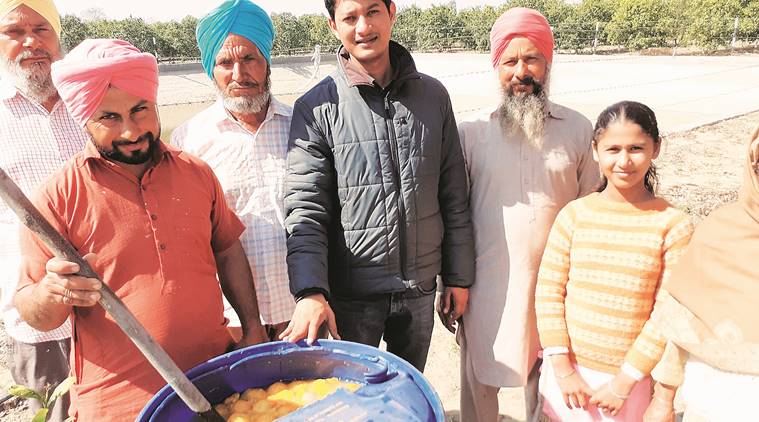 Kuldeep Singh of Mal Singh Wala village has previously made jamun fruit waste enzymes and used them in his chilli fields.
Kuldeep Singh of Mal Singh Wala village has previously made jamun fruit waste enzymes and used them in his chilli fields.
The fallen fruit has always been a major challenge for Punjab’s kinnow farmers, who have to quickly bury them lest they rot and attract pests, posing a threat to the healthy fruit still hanging from the plant.
But two kinnow growers of Punjab have now launched a start-up to prepare bio enzymes from kinnow waste in the ongoing harvesting season. This enzyme solution will to be used as a growth promoter for plants and soil health, as well as to clean floors and toilets.
The idea of making bio enzymes to improve environmental and soil health and provide access to less chemical fruits and vegetables is the brainchild of the state horticulture department, which is also launching its own pilot project in two areas including Abohar by roping in several farmers.
Bhudhlada Horticulture Development Officer Vipesh Garg, who is motivating farmers to implement this concept, said bio-enzymes can be prepared from the waste of any fruit but in Punjab, there is a huge potential of preparing these from kinnow, which has the largest area under it among all fruits.
Retired Colonel Rashneel Chahal of Narinderpura village and Kuldeep Singh of Mal Singh Wala village in Mansa district are preparing bio enzymes of 200 litres each at their respective kinnow orchards by using the peel and pulp of the fallen fruit, which is otherwise wasted.
Kuldeep, who had made jamun fruit waste enzymes and used them in his chilli fields, said he will use replicate the process in his 11-acre kinnow orchard and vegetable fields. “The fallen kinnow fruit is a huge wastage and we need to bury it under the soil, otherwise it rots and invites flies which are harmful to the healthy fruit. A fallen kinnow has a life of around 10 days, after which it rots and cannot be used for making enzymes,” he added.
How bio-enzymes are prepared
To prepare 200 litres of bio-enzymes, one needs 30 kg of kinnow, 10 kg jaggery and 100 litres of water. After washing the skin of the dropped fruit, both skin and plum are put in a 200-litre drum along with water and jaggery in a ratio of 1:3:10 (jaggery, kinnow, and water) and then covered with a lid. The enzymes can be prepared using two methods — using yeast and without it.
In the first method, the solution can be prepared in 40-45 days and farmers need to open the lid every day for a few minutes for the first two weeks and then once in a week. In a second method, it is kept for three months for fermentation and the lid of the drum is required to be opened daily during the first 30 days then twice in a week for few minutes in the next 30 days and then once in a week in last month. The mixture also needs to be stirred for a few seconds while the lid is opened.
“Enzymes can be a good additional source of earning for the kinnow farmers if the government supports marketing of the same,” said Col Chahal, who owns a 15-acre orchard having around 1,800 kinnow plants.
“I have delved into biofertilisers too and this solution of kinnow waste is very useful in our farm and home. In the future, I hope to sell it in the market by preparing a good amount which needs government support for marketing,” he further said, adding that farmers’ clusters must be formed to meet the marketing solution.
This process is unlikely to cost much for farmers as raw material (citrus fruit) is available to them at their orchard and jaggery does not cost much. Such a solution is available at Rs 400 per litre in the market.
Pilot project
Horticulture Department Director Shailender Kaur said that the department is also going to start a pilot project in two areas including one at the kinnow belt in Abohar where there is a large amount of kinnow waste available. “Farmers can convert any fruit and vegetable waste into bio enzymes to use at the farm level which can raise farmers’ income by reducing their cost of cultivation,” she added.
Kaur said a litre of solution is required to be mixed in 100 litres of water for spraying on plants. “It is a great solution for urban gardening and kitchen gardens,” she added.
For human consumption, the ratio is a one-litre solution to 1000 litres of water.
Garg said, “There are three fruit falls in kinnow crop. The first fall is being used by pharma companies to extract some beneficial substances. At the other two stages, the fallen fruit can be converted into bio enzymes at farm level to be used as floor and toilet cleaners, plant fertiliser and growth promotions.”
“Technically, bio enzymes are known as effective microorganisms. Bio enzymes basically have the potential to revive dying soil and help reduce the injudicious use of chemical load on vegetables,” said Garg.
Experts said a full-grown plant of kinnow bears around one lakh flowers, of which 50-60 per cent fall and the remaining flowers bear nearly 40,000 to 50,000 fruits, of which only 2,000 fruits are harvested per plant. They said that two quintals’ fallen kinnow can be collected from a one-acre orchard before final harvesting in a season.